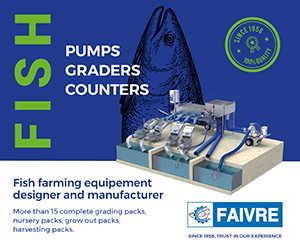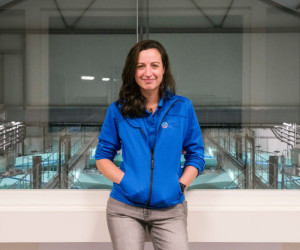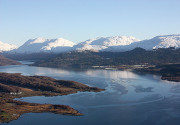| |
| |
 |
 |
| |
 |
|
@{mv_date_MMM d, yyyy}@ |
|
| |
 The Conservation Fund’s Freshwater Institute, an internationally-renowned research and development program focused on recirculating aquaculture systems (RAS), and Cargill, a leader in animal feeds solutions, have announced a multi-year agreement to develop, evaluate, and enhance feeds for the growing land-based aquaculture industry.
» Read more
The Conservation Fund’s Freshwater Institute, an internationally-renowned research and development program focused on recirculating aquaculture systems (RAS), and Cargill, a leader in animal feeds solutions, have announced a multi-year agreement to develop, evaluate, and enhance feeds for the growing land-based aquaculture industry.
» Read more
Equipment supplier, AKVA, has announced it has finalised a contract for a full grow-out recirculating aquaculture system (RAS) project from Norwegian company, AquaCon, following a preliminary announcement made in June that AKVA had entered into a contract for the construction of a land-based fish farm for AquaCon, in Maryland, on the U.S. East Coast.
» Read more
Following 10 years of planning, Pure Salmon has announced southwest Virginia will become the home of its new salmon farm. Construction for Pure Salmon’s new US $228 million recirculating aquaculture system (RAS) facility has begun, and when fully-built and running, is expected to raise and process up to 20,000 tons of salmon, annually.
» Read more
|
| |
 |
 |
| |
|
| |

Since she was a child, Carlota Castaneda-Cobo has always been fascinated by the ocean. When she decided to make the ocean her life’s work, she found a calling within a calling in the world of aquaculture.
>> Learn more |
| |
|
| |
 Ballan wrasse have already been found to control sea lice in farmed salmon, but their ability to do so effectively depends on keeping them content in their environment. Now, researchers are investigating the best conditions in ballan wrasse hatcheries.
» Read more
Ballan wrasse have already been found to control sea lice in farmed salmon, but their ability to do so effectively depends on keeping them content in their environment. Now, researchers are investigating the best conditions in ballan wrasse hatcheries.
» Read more |
| |
 |
 |
| |
|
| |
 Columbi Salmon recently held a NOK 162-million (US $18.6 million, EUR €15.9 million) funding round, which has confirmed ongoing interest by some of Norway’s prominent seafood backers in recirculating aquaculture system- (RAS-) based salmon farming.
» Learn more
Columbi Salmon recently held a NOK 162-million (US $18.6 million, EUR €15.9 million) funding round, which has confirmed ongoing interest by some of Norway’s prominent seafood backers in recirculating aquaculture system- (RAS-) based salmon farming.
» Learn more
BioMar Group has announced its investment plan to expand the capacity for extruded shrimp feed in Ecuador. The two-phased installation will bring a total of four new lines with a combined capacity of 200,000 tons at BioMar’s facilities in Guayaquil.
» Learn more
|
| |
|
| |

|
| |
 |
 |
| |
|
| |

|
| |
| |














